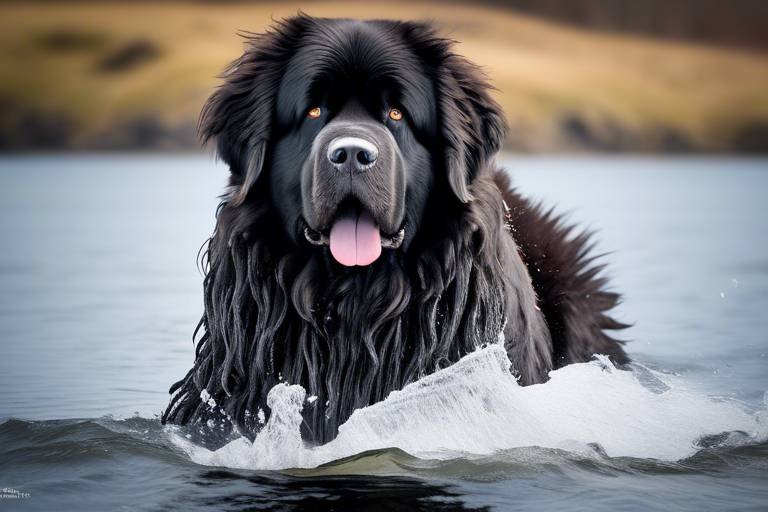The Traits of the Newfoundland Dog - Gentle Giants of the Water
Newfoundland dogs, often referred to as the gentle giants of the canine world, are truly remarkable creatures that captivate the hearts of those who encounter them. With their impressive size, friendly demeanor, and undeniable charm, these dogs have earned a special place in many families' homes. Originating from the rugged terrains of Newfoundland, Canada, they were originally bred for their strength and swimming ability, making them exceptional working dogs in aquatic environments. But beyond their physical prowess, it's their unique personality traits and adaptability that make them beloved companions. In this article, we will explore the various characteristics that define Newfoundland dogs, from their physical attributes to their temperament, and how they can fit seamlessly into family life.
Newfoundland dogs are known for their impressive size and strength. Standing anywhere from 26 to 28 inches tall at the shoulder and weighing between 100 to 150 pounds, they are a sight to behold. Their distinctive physical features include a thick, water-resistant double coat that can come in various colors such as black, brown, gray, and Landseer (white with black markings). This coat not only contributes to their majestic appearance but also provides insulation when they swim in icy waters. The breed's broad head, powerful neck, and deep chest give them a robust build, while their large, webbed feet are designed for swimming, making them natural lifeguards in aquatic environments.
These gentle giants possess a unique temperament that sets them apart from other breeds. Newfoundlands are known for their friendly and loyal nature, making them ideal companions for families, children, and even other pets. They are naturally patient and calm, which allows them to interact beautifully with kids, often displaying a protective instinct that ensures the safety of their little human friends. Their sociable personality means they thrive on companionship, and they are not fond of being left alone for extended periods. This makes them excellent family pets, as they enjoy being involved in family activities and are always eager to please.
Newfoundlands are intelligent dogs that respond well to training. Their eagerness to learn and please their owners makes them relatively easy to train, provided that positive reinforcement methods are used. They thrive on praise and rewards, making training sessions a fun and engaging experience. However, it's essential to keep training sessions short and varied to maintain their interest. Consistency is key, as these dogs can sometimes exhibit a stubborn streak. The best training methods for Newfoundlands involve patience, kindness, and a firm but gentle approach.
Proper socialization is crucial for Newfoundland dogs. Exposing them to various environments, people, and other animals from a young age will help them develop into well-rounded pets. This can include visits to parks, interactions with other dogs, and exposure to different sounds and sights. A well-socialized Newfoundland is more likely to be confident and adaptable, reducing the risk of behavioral issues later in life.
Understanding the typical behaviors of Newfoundlands helps owners manage their expectations. They are known for their playful nature, often engaging in games with family members or splashing around in water. Their protective instincts make them vigilant watchdogs, always alert to potential threats. Additionally, their love for water is unparalleled; whether it’s a lake, pool, or ocean, they are drawn to it like a magnet. This affinity for water activities makes them great companions for outdoor enthusiasts.
Like all breeds, Newfoundland dogs have specific health concerns that potential owners should be aware of. Common health issues include hip dysplasia, heart problems, and certain types of cancer. Preventive care, including regular veterinary check-ups, a balanced diet, and maintaining a healthy weight, is essential to ensure their overall well-being. Understanding these health considerations can help owners take proactive steps to keep their beloved companions healthy and happy.
Despite their large size, Newfoundland dogs require moderate exercise. Daily walks, playtime in the yard, and swimming sessions are excellent ways to keep them physically and mentally stimulated. It's important to strike a balance; while they enjoy physical activity, they can also be quite content lounging around the house. Owners should aim for at least an hour of exercise each day to keep their Newfoundlands fit and engaged.
Given their affinity for water, Newfoundlands excel in aquatic activities. Swimming is not just a pastime for them; it’s an instinctual behavior that they thrive on. Activities such as dock diving, water rescue training, and simply playing fetch in the water can provide them with the exercise they need while also reinforcing their natural swimming abilities. These water-related exercises are beneficial for both the dog and its owner, creating opportunities for bonding and fun.
Maintaining a Newfoundland's coat requires regular grooming. Their thick fur can become matted if not properly cared for, so brushing them at least once a week is recommended. During shedding seasons, more frequent grooming may be necessary. Owners should also pay attention to their nails, ears, and teeth, ensuring that all aspects of their hygiene are maintained. Using the right tools, such as slicker brushes and de-shedding tools, can make the grooming process easier and more effective.
- Are Newfoundland dogs good with children? Yes, Newfoundlands are known for their gentle nature and are excellent companions for children.
- How often should I groom my Newfoundland? Regular grooming is essential; aim for at least once a week, with more frequent sessions during shedding seasons.
- Do Newfoundlands like to swim? Absolutely! They are natural swimmers and love water activities.
- What health issues are common in Newfoundland dogs? Common health concerns include hip dysplasia and heart problems; regular vet visits are important for early detection.

Physical Characteristics
When you think of Newfoundland dogs, the first thing that comes to mind is their **impressive size**. These gentle giants can weigh anywhere from 100 to 150 pounds, and their height typically ranges between 26 to 28 inches at the shoulder. But it’s not just their size that captivates; it’s their **majestic appearance** that truly sets them apart. With a broad head, strong neck, and a powerful, muscular build, Newfoundlands exude an aura of strength and grace. Their **webbed feet** and **otter-like tails** are unique adaptations that make them exceptional swimmers, a trait that has been honed over generations as they assisted fishermen in water rescues.
Their coat is another defining feature. Newfoundlands have a **thick, water-resistant double coat** that not only protects them from the cold but also helps them stay buoyant in water. The outer coat is long and coarse, while the undercoat is soft and dense, providing insulation. This coat comes in several color variations, including black, brown, gray, and Landseer (white with black markings). Each color adds to their charm, but regardless of the shade, their **fluffy fur** is undeniably one of their most endearing characteristics.
In terms of grooming, their coat requires regular maintenance to prevent matting and to keep their skin healthy. A **weekly brushing** is generally recommended, along with occasional baths to keep them smelling fresh. It's important to note that Newfoundlands shed moderately year-round and experience heavier shedding during seasonal changes. Understanding these grooming needs is crucial for any prospective owner who wants to keep their Newfoundland looking its best.
To summarize their physical characteristics, here’s a quick table highlighting some key attributes:
| Attribute | Description |
|---|---|
| Weight | 100 to 150 pounds |
| Height | 26 to 28 inches |
| Coat Type | Thick, water-resistant double coat |
| Color Variations | Black, brown, gray, Landseer |
| Special Features | Webbed feet, otter-like tail |
So, whether you're drawn to their **imposing stature**, their **lovely coats**, or their **gentle disposition**, Newfoundland dogs are truly a sight to behold. They are not just large dogs; they are a **blend of beauty and functionality**, perfectly designed for both companionship and work in aquatic environments. If you’re considering welcoming one of these magnificent creatures into your home, be prepared for a loyal friend who will undoubtedly make a lasting impression on your heart and your family.

Temperament and Personality
The Newfoundland dog is often affectionately referred to as a gentle giant, and for good reason. With their massive size and soft demeanor, they embody a unique blend of strength and kindness that makes them stand out among other breeds. These dogs are not just big; they have a heart that's even bigger! Their friendly disposition allows them to easily bond with family members, friends, and even strangers. Imagine a fluffy teddy bear that can swim like a champion and protect your kids; that's your Newfoundland!
One of the most remarkable traits of Newfoundlands is their loyalty. They form strong attachments to their families and are known to be incredibly protective, especially around children. This breed has a natural instinct to look after those they love, making them ideal companions for families. They are patient and gentle with kids, often becoming their playmates and guardians. It's not unusual to see a Newfoundland lying on the floor, surrounded by children, as they enjoy a game of tug-of-war or simply relax together.
Newfoundlands are also known for their calm and easygoing nature. Unlike some breeds that are hyperactive and need constant stimulation, Newfoundlands tend to be more laid-back. They enjoy a good romp in the yard but are just as happy lounging around the house. Their temperament makes them suitable for various living situations, from bustling households to quieter homes. However, they do need social interaction and mental stimulation to prevent boredom; after all, even gentle giants need some fun!
When it comes to interacting with other pets, Newfoundlands usually get along well. Their friendly nature allows them to coexist peacefully with dogs, cats, and even smaller animals. However, early socialization is crucial. Exposing your Newfoundland to different pets and environments will help them develop into a well-rounded companion. Just picture a Newfoundland frolicking in the park, playing fetch with other dogs while keeping a watchful eye on the little ones running around. That’s the essence of their personality!
However, it’s essential to note that, like any breed, Newfoundland dogs can exhibit some common behavioral traits. They are known for their playfulness and often engage in silly antics that can bring a smile to anyone's face. They also have a natural affinity for water, which can sometimes lead them to jump into pools or lakes at the first opportunity. Their protectiveness can sometimes border on being overly cautious, especially if they sense a threat to their family. This protective nature, combined with their playful spirit, creates a well-rounded personality that is both endearing and admirable.
In summary, the Newfoundland dog is a perfect blend of loyalty, gentleness, and playful energy. They thrive in family environments where they can be active participants in daily life. Whether it's playing with children, keeping watch over their loved ones, or simply being a comforting presence in the home, Newfoundlands are indeed a treasure. Their temperament and personality make them not just pets, but cherished family members.
- Are Newfoundland dogs good with children? Yes, they are known for their gentle and protective nature, making them excellent companions for kids.
- Do Newfoundlands require a lot of exercise? While they need moderate exercise, their calm demeanor means they can adapt to different activity levels.
- How do Newfoundlands interact with other pets? They typically get along well with other animals, especially if socialized from a young age.
- Are they easy to train? Newfoundlands are intelligent and respond well to positive reinforcement training methods.
Intelligence and Trainability
When it comes to intelligence, Newfoundland dogs are in a league of their own. These gentle giants not only possess a remarkable capacity for learning but also exhibit a keen understanding of their surroundings. Their intelligence is often compared to that of a young child, making them incredibly responsive to commands and training. But what does this mean for you as a potential owner? Well, it means that with the right approach, your Newfoundland can become a well-mannered and obedient companion.
Newfoundlands thrive on positive reinforcement. This training method involves rewarding desired behaviors with treats, praise, or playtime. It's essential to remember that these dogs can be sensitive to harsh training methods, which can lead to anxiety or resistance. Instead, think of training as a fun game where both you and your dog can bond over learning new tricks. For instance, teaching your Newfoundland to fetch a ball in the water not only reinforces their swimming skills but also strengthens your relationship.
One of the key aspects of training Newfoundlands is their ability to pick up on cues quickly. They are often eager to please their owners, which makes them highly trainable. However, their independent nature can sometimes lead to a stubborn streak. To mitigate this, consistency is crucial. Establishing a routine and using clear commands will help your Newfoundland understand what you expect from them. For example, using the same word for "sit" every time will create a stronger association in their mind.
Socialization plays a vital role in the intelligence and trainability of Newfoundland dogs. Exposing them to various environments, people, and other animals at a young age can enhance their adaptability and confidence. A well-socialized Newfoundland will be more comfortable in different situations, which in turn makes training easier. Consider enrolling your pup in puppy classes or group training sessions to provide them with valuable experiences.
To give you an idea of how intelligent these dogs are, here’s a quick comparison of their trainability with other breeds:
| Dog Breed | Intelligence Level | Trainability |
|---|---|---|
| Newfoundland | High | Very High |
| Labrador Retriever | High | Very High |
| Beagle | Moderate | Moderate |
| Bulldog | Low | Low |
In summary, Newfoundlands are not just large, fluffy companions; they are intelligent and trainable dogs that can excel in various roles, from family pets to working dogs. With patience, positive reinforcement, and proper socialization, you can unlock the full potential of your Newfoundland, making your training journey both rewarding and enjoyable.
- How long does it take to train a Newfoundland? Training can vary, but with consistency and patience, you can expect to see significant progress within a few weeks.
- Are Newfoundlands easy to train? Generally, yes! They are intelligent and eager to please, which makes them responsive to training.
- What training methods work best for Newfoundlands? Positive reinforcement is the most effective method for training these dogs.
- How important is socialization for Newfoundlands? Extremely important! Early socialization helps them become well-adjusted and confident adults.
Socialization Needs
When it comes to raising a Newfoundland dog, one of the most crucial aspects to consider is their . These gentle giants, while known for their friendly and loving nature, require proper exposure to various environments, people, and other animals to thrive. Imagine a young Newfoundland, all fluffy and curious, exploring the world around them. Without the right socialization, they might grow up to be unsure or anxious in unfamiliar situations, which is the last thing you want for such a magnificent breed.
Socialization should begin early, ideally when they are puppies. During this critical period, Newfoundlands are like little sponges, soaking up experiences that will shape their behavior for life. Taking them to different places, such as parks, pet stores, or even busy streets, can help them become accustomed to various sights and sounds. It's important to introduce them to different types of people—children, adults, and even those wearing hats or sunglasses. This exposure helps them develop a balanced temperament and reduces the likelihood of fearful or aggressive behaviors later on.
Furthermore, interaction with other dogs is essential. This not only helps them learn proper dog etiquette but also fosters their playful nature. Arrange playdates with other friendly dogs or enroll them in puppy classes. These interactions can teach them how to communicate effectively with their canine companions. Remember, a well-socialized Newfoundland is typically a happy and confident one, capable of enjoying all the adventures life has to offer.
To ensure that your Newfoundland grows into a well-rounded adult, consider the following socialization strategies:
- Varied Environments: Regularly expose your dog to different settings, such as urban areas, rural environments, and even crowded events.
- Positive Experiences: Make every new experience positive. Use treats and praise to reward your dog for calm behavior in new situations.
- Group Activities: Engage your Newfoundland in group classes or dog sports to enhance their social skills and build confidence.
In summary, socialization is not just a one-time task but an ongoing process. By actively involving your Newfoundland in various social situations, you’re not only helping them develop into a well-adjusted adult but also strengthening the bond you share. Remember, a well-socialized Newfoundland is a joy to be around, bringing happiness and love to your home.
Q: When should I start socializing my Newfoundland puppy?
A: It's best to start socializing your Newfoundland puppy as early as 7 to 8 weeks old. This is a critical time for their development.
Q: How can I tell if my Newfoundland is well-socialized?
A: A well-socialized Newfoundland will be comfortable around new people, other pets, and different environments. They should display confidence and curiosity rather than fear or aggression.
Q: What are some signs of poor socialization?
A: Signs of poor socialization include excessive barking, fearfulness, aggression, or reluctance to explore new things. If you notice these behaviors, additional socialization may be needed.
Q: Can older dogs be socialized?
A: Yes, while it may take more time and patience, older dogs can still be socialized. Gradual exposure to new experiences can help them adjust.
Common Behavioral Traits
Newfoundland dogs, often referred to as the gentle giants of the canine world, are not only known for their impressive size but also for their unique behavioral traits that make them stand out as family pets. One of the most prominent characteristics of Newfoundlands is their playfulness. These dogs have a natural inclination to engage in fun activities, making them great companions for children. Their playful nature often manifests in their love for games like fetch, swimming, and even just goofing around in the backyard. Imagine a giant teddy bear bounding through the grass, bringing joy and laughter to everyone around!
Another significant trait of Newfoundlands is their protective instinct. These dogs are known to be very loyal to their families and will often take on the role of a guardian. Their size alone is enough to deter potential intruders, but it's their innate sense of loyalty that truly shines. They will not hesitate to protect their loved ones if they sense any danger, making them excellent watchdogs. However, this protective nature must be balanced with proper training to ensure they don’t become overly territorial.
Additionally, Newfoundlands are famous for their affinity for water. It’s almost as if they were born to swim! This breed has webbed feet and a water-resistant coat, making them natural swimmers. Their love for water often leads them to engage in activities like swimming in lakes or oceans, and they can even be trained for water rescue missions. This characteristic not only highlights their physical abilities but also their playful and adventurous spirit. Imagine taking your Newfoundland to the beach, watching as they joyfully splish-splash in the waves – it’s a sight to behold!
However, owning a Newfoundland also comes with the responsibility of understanding their emotional needs. These dogs thrive on companionship and can suffer from separation anxiety if left alone for extended periods. They are social creatures who love to be around their families, and their gentle disposition makes them great with children and other pets. Therefore, it’s essential to provide them with plenty of social interaction and mental stimulation to keep them happy and healthy.
In summary, the common behavioral traits of Newfoundland dogs include:
- Playfulness: They enjoy engaging in fun activities and games.
- Protectiveness: Loyal guardians who will defend their families.
- Love for Water: Natural swimmers who thrive in aquatic environments.
- Emotional Needs: Require companionship and social interaction.
Understanding these traits is crucial for any prospective Newfoundland owner. By recognizing their playful nature, protective instincts, affinity for water, and emotional needs, you can ensure that your Newfoundland not only fits into your family but also thrives in its environment. With proper training and socialization, these gentle giants can be the perfect addition to any household.
Q: Are Newfoundlands good with children?
A: Absolutely! Newfoundlands are known for their gentle and friendly demeanor, making them excellent companions for children. They are patient and protective, which is a perfect combination for family life.
Q: How much exercise do Newfoundlands need?
A: Despite their large size, Newfoundlands require moderate exercise. Daily walks and playtime are essential to keep them physically and mentally stimulated.
Q: Do Newfoundlands shed a lot?
A: Yes, Newfoundlands do shed, especially during seasonal changes. Regular grooming is necessary to manage their thick coat and minimize shedding.
Q: Are Newfoundlands easy to train?
A: They are intelligent and respond well to positive reinforcement training methods. Early socialization and consistent training will help them develop into well-behaved pets.
Health Considerations
When it comes to the health of Newfoundland dogs, it's crucial to understand that, like all breeds, they come with their own set of potential health issues. These gentle giants are not just adorable; they are also a breed that requires a keen eye for health management. One of the most common concerns among Newfoundlands is their predisposition to certain genetic conditions. For instance, they are known to be susceptible to hip dysplasia, a condition where the hip joint doesn't fit snugly into the hip socket, leading to pain and mobility issues.
Another significant health concern is cardiac issues, particularly dilated cardiomyopathy, which affects the heart's ability to pump blood effectively. Regular veterinary check-ups can help in early detection of such conditions, allowing for timely intervention. Additionally, obesity is a common issue that can exacerbate many health problems in Newfoundlands. Owners should monitor their dog's weight closely and ensure they maintain a healthy diet and exercise regimen.
It's also important to be aware of common skin conditions that can affect Newfoundlands. Their thick, water-resistant coat can trap moisture and lead to skin irritations or infections. Regular grooming is essential not just for aesthetics but for the overall health of their skin and coat. A well-groomed Newfoundland is less likely to suffer from these issues. To keep your Newfoundland healthy, consider the following health care practices:
- Routine veterinary check-ups to monitor for genetic conditions
- A balanced diet tailored to their specific needs
- Regular exercise to prevent obesity
- Consistent grooming to maintain skin and coat health
Preventive care is key in ensuring that your Newfoundland lives a long, healthy life. Keeping your furry friend up to date with vaccinations and parasite prevention is non-negotiable. Additionally, being proactive about their dental health can prevent issues down the line, as dental disease can lead to more serious health problems if left untreated. Regularly brushing your dog's teeth and providing dental chews can contribute significantly to their overall well-being.
In summary, while Newfoundland dogs are generally hearty and resilient, they do have specific health considerations that every owner should be aware of. By staying informed and proactive about their health, you can ensure that your gentle giant thrives in your home for many years to come.
Here are some common questions that potential Newfoundland owners often ask:
- What are the most common health issues in Newfoundlands?
Newfoundlands are prone to hip dysplasia, cardiac issues, and skin conditions. - How often should I take my Newfoundland to the vet?
Routine check-ups are recommended at least once a year, but more frequent visits may be necessary for older dogs or those with existing health issues. - What can I do to prevent obesity in my Newfoundland?
Monitor their diet, provide regular exercise, and avoid overfeeding with treats. - How important is grooming for my Newfoundland's health?
Regular grooming is crucial to prevent skin infections and maintain coat health.

Exercise Requirements
When you think about the Newfoundland dog, you might picture a big, fluffy companion lounging around the house, but don't let that fool you! Despite their large size, these gentle giants have specific that are essential for their health and happiness. It's crucial to strike the right balance between keeping them active and ensuring they don't overexert themselves, especially given their unique build.
Newfoundlands thrive on moderate exercise, which is vital for maintaining their physical and mental well-being. A daily routine that includes around 30 to 60 minutes of exercise is ideal. This can take various forms, from leisurely walks to more engaging activities like swimming or playing fetch. Their natural affinity for water makes aquatic exercises a perfect fit! Just imagine your Newfoundland joyfully splashing around in a lake or pool, their massive paws propelling them through the water with grace.
It's important to remember that while Newfoundlands enjoy their playtime, they can be prone to certain health issues, such as hip dysplasia and heart problems. Therefore, moderation is key. Over-exercising can lead to injuries or exacerbate existing conditions. Always pay attention to your dog's cues; if they seem tired or reluctant to continue, it's best to take a break. Incorporating a variety of activities into their routine can help keep them engaged and excited about exercise.
Here are some excellent ways to meet your Newfoundland's exercise needs:
- Swimming: Their natural swimming ability makes this an ideal form of exercise.
- Walking: Daily walks are great for bonding and keeping them active.
- Fetch: A game of fetch in a safe, open area can be thrilling for them.
- Agility Training: Setting up a mini agility course can provide mental stimulation.
Always keep in mind that mental stimulation is just as important as physical exercise for Newfoundlands. Engaging in puzzle games, obedience training, or even teaching them new tricks can help keep their minds sharp and focused. A tired dog is a happy dog, and ensuring that your Newfoundland is both mentally and physically stimulated will lead to a more balanced and content companion.
Lastly, it's essential to consider the climate when planning your Newfoundland's exercise routine. These dogs are known for their thick, water-resistant coats, which can make them susceptible to overheating in hot weather. Be sure to exercise them during cooler parts of the day, and always have fresh water available. With the right approach to exercise, your Newfoundland can lead a healthy, happy life filled with joyful moments and adventures.
1. How much exercise does a Newfoundland dog need daily?
Newfoundlands typically require 30 to 60 minutes of moderate exercise each day, including walks, swimming, or playtime.
2. Can Newfoundland dogs swim?
Absolutely! Newfoundlands are natural swimmers and often enjoy spending time in the water.
3. What are some signs that my Newfoundland is over-exercising?
Signs of over-exercising include excessive panting, reluctance to continue, limping, or signs of fatigue. Always monitor your dog during exercise.
4. Is it safe to exercise my Newfoundland in hot weather?
Exercise should be minimized during hot weather. Opt for cooler times of the day and ensure your dog has access to water.
Water Activities
Newfoundland dogs are often affectionately referred to as "gentle giants," and their love for water is one of the many traits that make them truly unique. These dogs were originally bred to assist fishermen in Newfoundland, Canada, which explains their natural affinity for aquatic environments. If you’ve ever seen a Newfoundland dog swim, you know it’s like watching a graceful ballet unfold in the water. Their powerful limbs and webbed feet allow them to glide effortlessly, making them excellent swimmers. This innate ability not only showcases their physical prowess but also highlights their historical role as water rescue dogs.
Engaging your Newfoundland in water activities is not just fun; it’s also essential for their physical and mental well-being. Regular exposure to water can help maintain their fitness levels, promote healthy joints, and prevent obesity, which is a common concern for larger breeds. Whether it’s a day at the beach, a dip in the lake, or a simple splash in the backyard pool, these activities can be incredibly beneficial. Here are some popular water activities that both you and your Newfoundland can enjoy together:
- Swimming: This is, of course, the most obvious activity. Newfoundlands love to swim, and they often take to the water like ducks. It’s a great way for them to exercise without putting too much strain on their joints.
- Water Retrieval Games: Using a floating toy or a ball, you can engage your Newfoundland in retrieval games. This not only stimulates their mind but also reinforces their natural instincts.
- Water Obstacle Courses: Setting up a simple obstacle course in the water can be an exciting challenge for your dog. Use floating platforms, hoops, or even a kiddie pool to create a fun environment.
Moreover, training your Newfoundland for water rescue can be a rewarding experience. Their natural instinct to save lives makes them perfect candidates for water rescue training. In fact, many Newfoundlands have been trained as lifeguards, and their ability to swim long distances while carrying a person to safety is nothing short of remarkable. If you’re interested in pursuing this path, consider enrolling in a water rescue training program with your furry friend.
Don’t forget about safety! Always supervise your Newfoundland during water activities, especially if they’re swimming in natural bodies of water. Be mindful of currents, water temperature, and other potential hazards. Additionally, consider investing in a dog life jacket, especially for younger or less experienced swimmers. This added layer of safety ensures that your gentle giant can enjoy their time in the water without any worries.
In conclusion, water activities are not just a pastime for Newfoundland dogs; they’re a crucial aspect of their physical and emotional health. By incorporating swimming, retrieval games, and even rescue training into your dog’s routine, you can enhance their quality of life while building a stronger bond between you and your furry companion. So grab that leash, pack some toys, and head to the water—your Newfoundland is waiting for an adventure!
1. Do all Newfoundland dogs like water?
Most Newfoundland dogs have a natural affinity for water due to their breeding history. However, individual preferences may vary, and some may need encouragement to get comfortable in water.
2. Can Newfoundland dogs swim in all types of water?
While Newfoundlands are excellent swimmers, it's important to ensure that the water is safe. Avoid areas with strong currents or unsafe conditions.
3. How often should I take my Newfoundland swimming?
It’s beneficial to take your Newfoundland swimming regularly, ideally several times a week, to keep them fit and happy.
4. What safety precautions should I take when my Newfoundland is in the water?
Always supervise your dog while swimming, consider using a life jacket, and be aware of environmental hazards like currents and temperature.
Grooming Needs
When it comes to grooming Newfoundland dogs, it's essential to understand that their magnificent coats require a bit of dedication and care. These gentle giants boast a thick, water-resistant double coat that not only contributes to their majestic appearance but also protects them in aquatic environments. However, this beautiful fur can become matted and tangled if not properly maintained, so regular grooming is a must!
Typically, Newfoundlands shed moderately year-round, with heavier shedding periods occurring in the spring and fall. To keep their coat healthy and free from mats, it's recommended to brush them at least once a week. During shedding seasons, you might find yourself reaching for the grooming tools more frequently—perhaps even daily! A good quality slicker brush or an undercoat rake can work wonders in removing loose fur and preventing mats. Don't forget to give special attention to areas prone to tangling, such as behind the ears and under the legs.
Bathing is another important aspect of grooming, but it should be done sparingly. Over-bathing can strip the natural oils from their coat, leading to dryness and irritation. A bath every couple of months is usually sufficient, unless they roll in something particularly smelly or dirty. When you do bathe your Newfoundland, use a gentle dog shampoo that is designed for their specific coat type. Rinse thoroughly to avoid any residue that could irritate their skin.
While grooming, it's also a great opportunity to check for any skin issues or parasites. Regularly inspect their ears, as Newfoundlands are prone to ear infections due to their floppy ears that can trap moisture. Keeping their ears clean and dry is crucial. You can use a vet-recommended ear cleaner to help maintain ear health.
Additionally, don't forget about their nails! Regular nail trimming is vital to prevent discomfort and potential injuries. If you can hear their nails clicking on the floor, it's time for a trim. A good rule of thumb is to check their nails every few weeks, and if you're unsure how to do it, your veterinarian or a professional groomer can provide guidance.
To summarize, grooming a Newfoundland is not just about maintaining their stunning appearance—it's also about ensuring their overall health and well-being. Here’s a quick reference table to help you remember the key grooming tasks:
| Grooming Task | Frequency | Tools Needed |
|---|---|---|
| Brushing | Weekly (more often during shedding season) | Slicker brush, undercoat rake |
| Bathing | Every 1-2 months | Dog shampoo, towels |
| Ear Cleaning | As needed | Vet-recommended ear cleaner |
| Nail Trimming | Every 3-4 weeks | Nail clippers or grinder |
With a bit of effort and the right tools, grooming your Newfoundland can be a rewarding experience that strengthens the bond between you and your furry friend. Remember, a well-groomed dog is a happy dog!
- How often should I groom my Newfoundland? - It's best to brush them at least once a week, with more frequent grooming during shedding seasons.
- Can I bathe my Newfoundland too often? - Yes, over-bathing can strip their coat of natural oils. Aim for a bath every couple of months.
- What tools do I need for grooming? - A slicker brush, undercoat rake, dog shampoo, and ear cleaner are essential.
- How can I tell if my Newfoundland needs a nail trim? - If you can hear their nails clicking on the floor, it's time for a trim.
Frequently Asked Questions
- What are the key physical characteristics of a Newfoundland dog?
Newfoundland dogs are known for their impressive size, typically weighing between 100 to 150 pounds. They have a thick, water-resistant double coat that can be black, brown, gray, or Landseer (white with black markings). Their large, webbed feet are perfect for swimming, and their muscular build makes them strong swimmers.
- Are Newfoundland dogs good with children?
Absolutely! Newfoundlands are often referred to as "gentle giants" because of their friendly and patient nature. They are known to be very good with children, displaying a playful yet protective demeanor, making them excellent family companions.
- How intelligent are Newfoundland dogs?
Newfoundlands are quite intelligent and eager to please, which makes them relatively easy to train. They respond well to positive reinforcement methods, and early training can help harness their potential and ensure they grow into well-behaved adults.
- What are the exercise requirements for a Newfoundland?
Despite their large size, Newfoundland dogs require moderate exercise. Daily walks and playtime are essential, but they are not as high-energy as some breeds. Activities like swimming are especially beneficial, given their affinity for water.
- Do Newfoundland dogs shed a lot?
Yes, Newfoundland dogs do shed, particularly during seasonal changes. Regular grooming is essential to manage their thick coat and minimize shedding. Brushing them at least once a week will keep their fur healthy and reduce the amount of hair around your home.
- What health issues are common in Newfoundland dogs?
Like many breeds, Newfoundlands are prone to certain health issues, including hip dysplasia, heart problems, and certain types of cancer. Regular veterinary check-ups and a healthy diet can help mitigate some of these risks.
- How do I socialize my Newfoundland dog?
Socialization is crucial for Newfoundlands. Start exposing them to various environments, people, and other animals from a young age. Positive experiences will help them become well-adjusted adults. Puppy classes can also be a great way to facilitate socialization.
- Can Newfoundland dogs be left alone for long periods?
Newfoundlands thrive on companionship and may not do well if left alone for extended periods. They can experience separation anxiety, so it's best to ensure they have company or engaging activities when you're away.
- What types of water activities are suitable for Newfoundlands?
Newfoundlands excel in various water activities, such as swimming, water retrieval games, and even lifeguard training. Their natural swimming ability makes them perfect companions for water sports, and they often enjoy playing in lakes or pools.


















